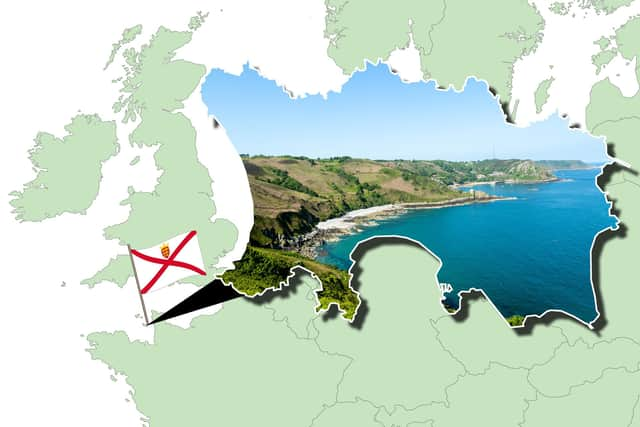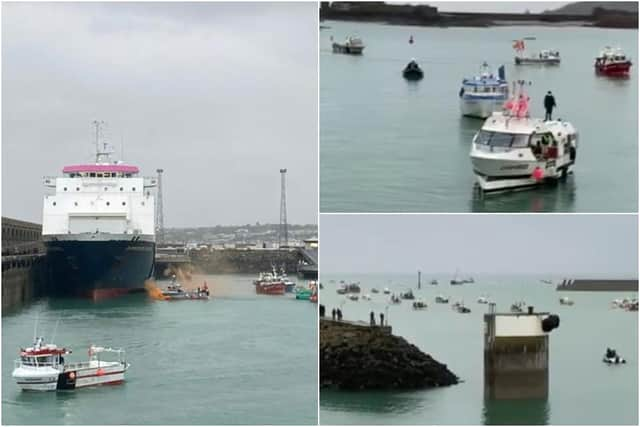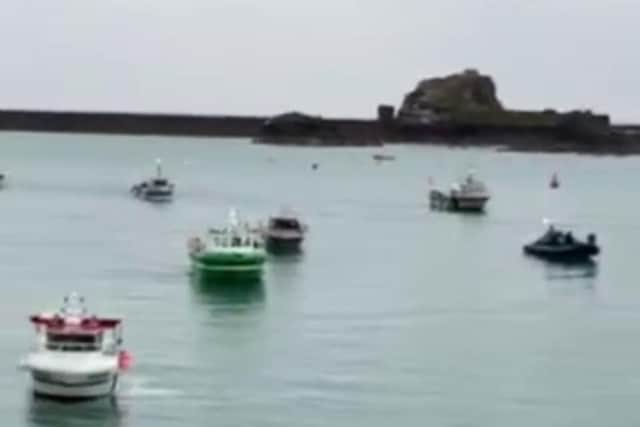Jersey fishing dispute: French harbour blockade protest explained as Royal Navy ships return to port
This article contains affiliate links. We may earn a small commission on items purchased through this article, but that does not affect our editorial judgement.
Two Royal Navy vessels sent to Jersey in response to a protest by French fishermen are to return to port.
The UK had sent the ships amid concerns of a blockade of the largest of the Channel Islands due to an ongoing row with France over post-Brexit fishing rights.
Advertisement
Hide AdAdvertisement
Hide AdHMS Severn and HMS Tamar were deployed by the UK Government to “monitor the situation” amid a protest by French fishing vessels at the port of St Helier over the lack of access.


One of the vessels was due to return home on Thursday (6 May) night, with the other heading to port on Friday.
Boris Johnson said he was “pleased that the situation in Jersey has been resolved” and thanked the Royal Navy for the swift response.
Here is everything you need to know.


Why is the row happening?
Tensions began last last week (30 April), when the island implemented new requirements under the terms of the post-Brexit UK-EU trade deal for boats to submit evidence of their past fishing activities in order to receive a licence to continue operating in Jersey waters.
The measures were not welcomed by French fishers who – due to the island’s close proximity to France – have historically fished in Jersey waters.
French maritime minister Annick Girardin then warned on Tuesday (4 May) that France was ready to take “retaliatory measures” after accusing the Channel Island of dragging its feet over issuing new licences.


Ian Gorst, Jersey’s External Relations Minister, insisted that there was no justification for such severe measures, the island was not seeking to bar boats, and that the dispute could be resolved amicably.
He said that of the 41 boats which sought licences under the new rules last Friday, all but 17 had provided the evidence required.
Advertisement
Hide AdAdvertisement
Hide AdGorst told the BBC Radio 4 Today programme: “It would seem disproportionate to cut off electricity for the sake of needing to provide extra details so that we can refine the licences.
"We absolutely respect the historic rights of French fishermen to fish in Jersey waters as they have been doing for centuries,” he added.
What happened at the protest?
Dozens of French boats arrived at the harbour on the morning of 6 May, with some crews setting off flares, according to the Jersey Evening Post.
French vessels first gathered from around 4.30am outside the harbour, before moving into the harbour after 6am, and leaving shortly after 7am.
Jersey fisherman Josh Dearing described the scene at the port of St Helier - the capital of the island – on Thursday morning as “like an invasion”, with the French fleet mostly made up of “big French dredgers and trawlers” of 12 metres or more.
Some 60 boats were estimated to have gathered at the port amid a “sea of red lights and flares”.
Dearing told the PA news agency: “There were a few hand-held flares and smoke flares going off and apparently a few maybe bangers and stuff going off from the French.
“It was quite a sight. It was impressive, I looked from the shore this morning and it was just like a sea of red lights and flares already going off at sea. It was like an invasion.”
Advertisement
Hide AdAdvertisement
Hide AdDuring the protest emergency talks were held on the water, with Jersey government representatives on one boat and representatives of the French fishing fleet on another, in order to comply with coronavirus restrictions.
How has Britain responded?
As the French mounted a protest, the UK sent its own ships to the island, with two Royal Navy vessels now patrolling waters around Jersey.
Downing Street has said the two Royal Navy ships were sent as a “precautionary measure” and the UK and Jersey governments would continue to work closely on the issue.
Prime Minister Boris Johnson spoke to Jersey chief minister John Le Fondre and external affairs minister Ian Gorst on Wednesday 5 May, and “underlined his unwavering support” for the island.
Asked if it was disproportionate to send Royal Navy vessels to patrol the waters around Jersey, Gorst told BBC News: “We have to take such threats seriously and respond appropriately.
"Those assets in Jersey waters are as a precautionary measure to monitor what’s happening in our waters and, as I’ve said, so far the protest has been peaceful, as we would expect,” he added.
Fisherman Dearing said he was “absolutely” pleased to hear that Royal Navy vessels were being deployed to patrol the waters around Jersey, telling PA the island is “completely unprotected.
"We’ve got nothing except for a few police officers. We don’t have a police boat, we don’t have a navy boat, we don’t have anything to protect us. The French can be hostile. All of our livelihoods are in that harbour and if they wanted to they could cause damage.”
What’s the latest?
Advertisement
Hide AdAdvertisement
Hide AdThe authorities in Jersey have promised further talks to help resolve the row, but the French government hit out at a “British failure” to abide by the terms of the UK-EU trade deal and warned it would “use all the leverage at our disposal” to protect the fishing industry.
The European Union also accused Jersey of breaching the deal signed by the UK and Brussels.
The UK has insisted that the Jersey authorities have a right to regulate fisheries in their waters under the Brexit trade agreement.
Le Fondre said the French fishermen had been able to leave Jersey “knowing that they had been listened to, and that a step has been taken towards resolving the issues that have arisen during the move to the new trade agreement”.
How far is Jersey from France?
Jersey lies off the coast of north-west France.
Just 14 miles from Normandy’s Cotentin peninsula (the spit of land that juts north-westward into the English Channel towards Great Britain), it is much closer to France than it is to the UK.
The closest part of the mainland UK to the island is approximately the Isle of Portland – the southernmost point of the county of Dorset – which lies around 90 miles from Jersey.
A message from the editor:
Thank you for reading. NationalWorld is a new national news brand, produced by a team of journalists, editors, video producers and designers who live and work across the UK. Find out more about who’s who in the team, and our editorial values. We want to start a community among our readers, so please follow us on Facebook, Twitter and Instagram, and keep the conversation going.
